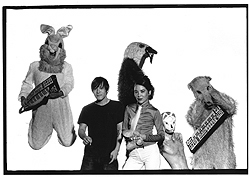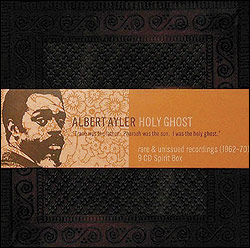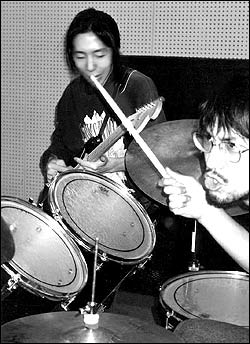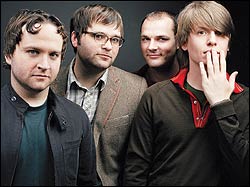IQU’s Sun Q (Sonic Boom) is the year’s cleverest and most varied groove album, a reassurance that once the cyborgs take over the world, there’ll still be walloping blurts of disco to dance to. The Seattle duo is also a roof-raising live act, which is how they ended up opening for . . . And You Will Know Us by the Trail of Dead on a recent tour. And they’re known for turning their shows into performance-art events. “Last New Year’s Eve,” keyboardist-singer Michiko Swiggs recalls, “we had a trapeze artist who choreographed this whole aerial performance with our set. We have a really big thing about cherry blossoms—I made these felt cherry blossoms that covered her hair, and we had balloons with confetti in them that we broke so it’d be like cherry blossoms falling over the crowd.”
The cherry-blossom image turns up again on the cover of Sun Q (a gorgeous package designed by the band with artist Chuck Dong and printed by Seattle’s Thingmakers) and on its opening track, “Under the Cherry Blossom,” a fluttering instrumental that breaks IQU’s long silence. Their debut, 1998’s Chotto Matte a Moment!, was largely based on their live performances, which then also featured stand-up bassist Aaron Hartman of Old Time Relijun. (In those days, they were known as icu; that changed after a tussle with another band with a similar name.) After Hartman left, there were two slightly distracted EPs, Girls on Dates and Teenage Dream, and then an extended break while they worked up the dance floor blast of Sun Q. (The album is named after multi-instrumentalist Kento Oiwa’s pronunciation of “thank you” on its title track.)
The neatest thing about IQU is their contrast of perfection and imperfection, the cherry blossoms they drop onto their digital grids. Both Swiggs’ and Oiwa’s singing voices are as winningly flawed as the voices that avant-disco genius Arthur Russell (a favorite of theirs) used on his records. Their songs run on sequencers’ perfectly aligned beats, but their favorite lead instrument is a theremin, the swooping electronic gizmo that approximates notes instead of hitting them. Oiwa’s most impressive theremin solo on Sun Q is a sparkling cover of the late Minnie Riperton’s virtuosic ballad “Loving You.” Swiggs is a big fan of Riperton’s early band Rotary Connection, but IQU actually got “Loving You”—or rather a fragment of it—in their heads when they toured with the Flaming Lips a few years ago.
“Wayne Coyne had these cassette tapes where he’d recorded the best one-minute segment of every song he loved,” Swiggs explains. “A guitar solo from Led Zep, that sort of thing. He had ‘Loving You’ on there, and we heard it every single day. A couple of years later, we started trying to work on covers that would use the theremin—we also do [the Beatles’] ‘Across the Universe’ live—and we were trying to think of a song that the theremin would be a good lead vocalist for, and we thought: ‘Loving You’! Her voice is so amazing and so high, and it’s so hard to sing. . . . “
Surprisingly, Oiwa and Swiggs mostly recorded Sun Q separately, trading a hard drive with ProTools files back and forth. “Kento might have spent a week or so just on a theremin part, at his house,” Swiggs says. “And then there are certain things we worked on together, where we needed each other’s energy, like ‘Puka,'” which presents the IQU aesthetic in miniature. The foursquare digital march that opens the song is punctuated by Oiwa’s turntable scratches, then gives way to a double-time Kraftwerkish synthesizer melody (with electric guitar drifting in on its margins) that alternates with a howling breakbeat-and-noise conflagration. IQU are an electronic dance band at their core, but a lot of their ideas about song structure and texture come from rock. And their onstage identity is very much about letting the audience watch the music being made—Oiwa is the only performer I’ve ever seen play guitar, turntables, and theremin simultaneously, while smoking a cigarette.
Swiggs notes that it’s been tough to reconfigure some of the album into pieces they can perform live—notably “Hamachi,” an ode that Oiwa sings to his favorite sushi (“Hey, hey, hey! Put it in your mouth!”), built on a rattling hook-and-swing percussion loop. But most of Sun Q‘s highlights come across just fine onstage. “The 9th Line,” Swiggs’ salute to coked-up fashionistas at the Baltic Room (where both members of IQU have worked), features a strutting Teena-Marie-at-Paisley-Park groove driven by Oiwa’s twitchy funk guitar and a greasy synth bass, as well as a couple of energetic scratching interludes; on the record, it also includes a break recorded in the ladies’ room by Swiggs and her best friend during a performance by Avenue D (of “Do I Look Like a Slut?” fame). And “Dirty Boy” is the great lost Daft Punk song, a wah-wah disco stomp with jazz-funk keyboards, Swiggs grinning ear-to-ear as she sings “my love for you is free-ee-ee-eaky” into a vocoder, and Oiwa cutting up a children’s record about a birthday party: “Surprise! Surprise! Surprise!” Like the rest of the record, it feels like an unexpected present itself.
IQU play the Showbox with Blonde Redhead and the Helio Sequence at 8 p.m. Fri., Nov. 12, $15 adv.; and the Paradox Theater with the Lights and Anna Oxygen at 8 p.m. Sat., Nov. 13, free.








